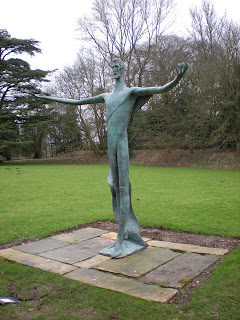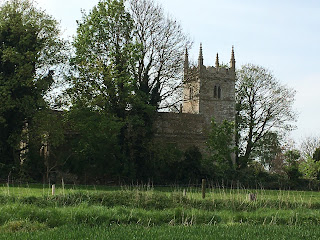NEW ORDER
Holygate
Obliteration and
obfuscation
in the papers, in the
landscape.
What was once, is not
now
and will not be again
You remember those
hillcrest villages
in Tuscany or the south
of France?
Here at Ridlington much
the same:
an ancient rectangle
atop the ridge;
a street plan perfectly
preserved;
the church on a bury so
visible below;
a castle (its
earthworks cut by a swimming pool)
and then an end
to the metalled road
where
I can walk on to the
sunset and another county
as if it was two
hundred years ago;
a peddler of trinkets
or a man herding sheep.
Such peculiar freedom;
history coming alive
in the dried up tubers
of one’s bones.
I’m
not in fact a tinker, more a spacecraft, sling-shotted (is that a word?) this
way and that round the parish planets of our own diocesan solar system, now
heading out towards other galaxies. And in those star systems, who knows, not
just things being done slightly differently, but entirely non-carbon-based
life-forms; alien bishops wearing the kind of head-dresses Whoopi Goldberg used
to sport in Star Trek. I once attended a convention at the World Council of
Churches which really did feel like that, in the gracious presence of Coptic,
Syriac, and Ethiopian Tewahedo Orthodox prelates, dressed in robes which might
have been designed by Westwood or Gaultier. Yes, I’m heading into Leicester Diocese along
Holygate Road, travelling west out of Ridlington on an uplifting track with
lovely views to both north and south. Laurie Lee on his way to Spain didn’t
feel this good.
The air’s very clear and fresh today. There’s every shade of green around me, lime and apple in the near fields, glossy emerald on the leaves of the bushes, hazy blue and myrtle beneath the distant ridge. Some school students, probably Year 10s, are out on a Bronze D. of E. trek. They look so young. We greet each other with hellos and nods of the head, because that’s what walkers do, isn’t it? I hope they’ll still be tramping joyfully around this beautiful countryside in sixty years’ time.
Turning off the ridge, I drop down the chalky Leighfield Way to Belton and sit in St. Peter’s church for a while. Leighfield is another ancient hunting forest, now a lovely tract of open land crossed by often unmetalled roads, another of which I take towards College Farm, regaining the ridge with a climb that’s stiff by the standards of this part of the world and mine. I pass a small detached cemetery, with three benches for passers-by to stop and contemplate the quiet greenery for a while. At the top of the hill I find an unnecessary confusion of paths because the farmer has declined to cut a diagonal gash across his field as he should – according to the OS. Momentary recourse to the compass, but then, skirting the length of the woodland I come to the lane and its steep little hill down to Launde Abbey.
Cromwell at Launde
Three books, two
thousand pages;
Cromwell’s life laid
bare.
Mantel’s skill our
heart engages;
language rich and rare
weaves a tapestry by
stages,
begs the reader to
compare
politics across the
ages,
hope contending with
despair.
Art can wound a mind
that’s tender,
underscore mortality.
Anticipating death can
render
us bereft of empathy.
Wealth and station,
race and gender
must decay to unity,
but here in Launde I
surrender
to the deep
tranquillity.
Just three months before his death, Thomas Cromwell wrote ‘…myself for Launde’, perhaps intending he should live there. His son Gregory did so for ten years. He’s buried in the grounds.
A serpent in Eden.
What follows is ecclesiastical stuff, but it isn’t only for C. of E. nerds. This should matter to you if you care at all about the parish system which has been a basic unit of British national structure for a thousand years. It has held communities together, and even today and for the future might in times of disaster be a mechanism of preservation and nourishment. As with the BBC, trashing it carries potentially dire consequences, and yet all the pressure is in the direction of its dismemberment.
I hesitate to call her a friend, but I’ve known and greatly admired the writer, broadcaster and priest Angela Tilby since university days. Her column in the Church Times is invariably full of wit and perception. She never shies away from saying what is true but controversial: on occasion she will admit to personal shortcomings and is happy to accept responsibility. She is, in short, a most unusual person in so many respects.
In recent weeks she’s drawn some criticism for what she’s said about the solutions being offered by some dioceses to the pickle in which the C. of E. finds itself, notably in this case by Leicester Diocese. We all know that if we factor the Church of England into: buildings, available finance, workforce (clergy) volunteer support (laity), the arithmetic current and future fails. Leicester’s pilot initiative is to test three areas with ‘minster communities’. One of these is named ‘The Launde Minster Community’ and comprises twenty-five parishes stretching west into Leicestershire from Launde. These communities will be staffed with a very limited number of clergy, backed up by ‘trained’ laity. The changes will be funded entirely from the ‘parish share’ which individual churches pay to the diocese, but it is admitted that even the immediate consequence will be to double that contribution out of the pockets of local parishioners and into the coffers of Leicester Central. Many (most?)of those contributors will inevitably be pensioners. Angela thinks, and for what it’s worth I agree, that this will be a ‘race to the bottom’: fewer services in some of these country churches, and so less incentive to put hand to pocket – a true circle of doom. Another consequence, desired by some in urban settings, may be a more widespread re-siting of faith style towards the evangelical and ‘modern’ (however one interprets that word). The ‘pilot’ cannot be seen to fail, and so no doubt will eventually be rolled out across Leicestershire, albeit in some slightly modified form. It discriminates in favour of the urban against the rural, and against the more elderly in favour of Lambeth-fantasy congregations of the middle-aged and young, who for reasons that are partly understood – but only partly – are currently not stepping up to support the Church financially.
It's irksome that this particular pilot has been called after a location which is a retreat centre serving both Leicester and Peterborough dioceses. It says so in big friendly letters by the tables where today I eat some nice ham sandwiches and a slice of Launde’s excellent lemon cake. Although it’s true that there was previously a ‘Launde Deanery’, it might appear to some that Leicester has hi-jacked the name for its reputational and publicity value. The Diocese surely needed to think about this. Unfortunately, there are other recent example of dioceses fishing across boundaries. Play nicely, children!
Similar things are currently afoot in the diocese of Truro, with opposing views about the degree to which change is being imposed from the centre rather than developed at a local level. Social class and the availability of finance are again issues, although not necessarily configured in the same way.
The
leader in last week’s Church Times drew attention to two documents from very
different quarters highlighting worrying perspectives on C. of E. unity. Its concluding
paragraph remarks: …it is disheartening for all who, despite cultural
differences, believe in a universal faith based on God’s love for all
people…it’s always a temptation to ‘walk apart’ as schism is described these
days…
Leighfield as it is today, though lovelier in reality than in this picture
Ironic, you might think, for someone who walks solo, to be touting the idea that we should be walking together in the spiritual sense. But so we should and must if we’re to survive, and help steer our nation in good directions.
Ridlington – Belton – Launde Abbey – Ridlington
Six hours. 18.5 km. Sunny and often clear, with a lively, gusting, north-easterly breeze, as has been unusually the case for much of the last month. 19 deg. C. Tomorrow we’re promised a ‘Spanish Plume’ and at least a ten degree rise of temperature.
In memory of Michael Brown who regularly read and enjoyed this blog; a lovely man
and sometime musical collaborator, who as I write I’m missing very much. He
was sound engineer for pioneering Christian folk-rockers: ‘The Water into
Wine Band’, whose first album ‘Hill Climbing for Beginners’ had been in my mind as I
laboured up and down the Leighfield slopes, only half a dozen hours before
hearing of Mike’s untimely death earlier in the week.







Comments
Post a Comment